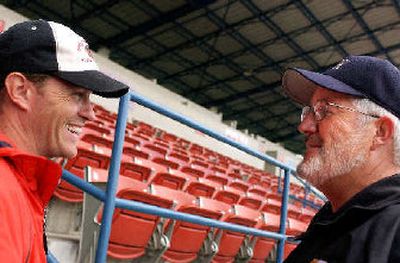Former major leaguer adjusts to quieter life

July 7, 1993. Thirty thousand fans packed the stadium that night. Kevin Stocker, 23, donned his Philadelphia Phillies uniform and headed out onto the field at Dodger Stadium. He was the starting shortstop against the Los Angeles Dodgers. The game went 20 innings, ending at 1:35 a.m. Stocker played all 20 innings. The Phillies won, 7-6. Stocker had been called up to the majors at 1:30 that very afternoon – 12 hours and 5 minutes earlier.
“It was an absolute dream,” Stocker recalls. “We went on to the World Series my first year in the majors.”
Stocker grew up in the Spokane Valley, graduated from Central Valley High School and attended the University of Washington on a baseball scholarship. After three years of college, he was drafted in the second round and signed with the Phillies. He spent two years in the minor leagues, 2 1/2 months at every level, until he was called up into the majors in 1993.
Stocker spent the next eight years living out his boyhood dream, playing for the Phillies as their regular shortstop and switch hitter (1993-97), for the Tampa Bay Devil Rays (1998-2000), and with the Anaheim Angels (2000), starting every game he played.
Playing for the Phillies was frosting on the cake. The Phillies are a family-owned team and the players were treated like family. And the Northeast “absolutely embraces sports,” says Stocker. He was constantly hounded for autographs.
The life of a major league baseball player is at once exhilarating and hectic. “Time is your enemy because you have so much of it to fill. I craved the three hours of the game,” Stocker says.
But the players’ lives on the road were extremely structured. They played 162 games in 180 days. Days off were spent traveling.
Stocker was one of the lucky ones, in that he enjoyed a solid marriage with a loving wife who loved baseball and supported the lifestyle. But the schedule was grueling and took its toll on the family.
“We’d spend three months in Spokane, then one month at spring training in a hotel. We’d repack and fly with the team. We had a house in Philadelphia, but I was gone half the time. The last year in the majors I had three kids. I’d signed on with Anaheim, but we were in Florida for spring training. I had to fly to California with the team, and my wife, Brooke, had to get the kids back to Spokane. She called and told me the airlines wouldn’t let her fly alone with three children under the age of 5.”
It was clear to Stocker that his priorities had shifted. “It was my faith and my family. I loved the game, loved the competition, but you have to have that certain edge or passion. It became tougher to train, and I was prone to injury. My knees and ankles eventually caught up with me. My edge was lost.”
At 36, Stocker is back home, retired from a dream career, figuring out day by day how to live a meaningful life outside the major league.
“The first couple years were tough for the whole family,” he says. “It was a big adjustment in family dynamics. I’d been gone seven to 10 days at a time before and needed a lot of structure in my daily routines, and now I was home full time, and no one was used to my daily presence in the family.”
Settling into the white-picket-fence mentality of suburban lifre has been a challenge for the Stockers, but the couple now live a relatively quiet life in Liberty Lake, where they’re busy raising their three young children, 9, 7 and 6. Brooke is a full-time homemaker and mother and is active in their church and the children’s school, and Kevin works part time as the color analyst for baseball games on CSTV (College Sports TV) and part time for Greenstone Management Co., enforcing covenants in housing developments. He also does some coaching on the side.
He says, “My favorite quote is, ‘The fun isn’t fun without the work.’ I needed meaningful work for the balance. Luckily, these jobs found me.” Working with people, and having a flexible schedule that allows time for his family, are viewed as real gifts.
The only regret he has is that he hasn’t finished college, but returning to school is still a viable option.
“It’s hard to have the dream behind you,” Stocker says. “Baseball was my first love. I was among the top 800 players in the country. Nothing will meet the same level of challenge for me. But my priorities are clear: faith, family and the enjoyment of productive work.”